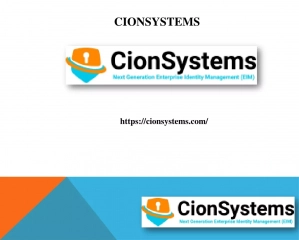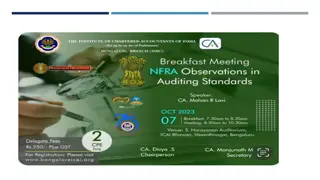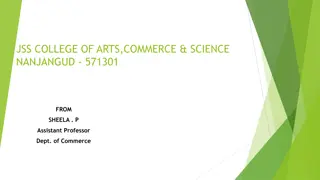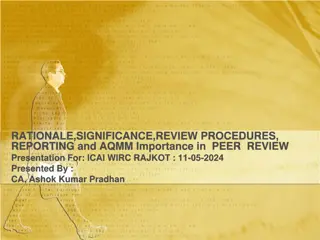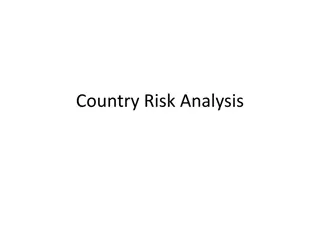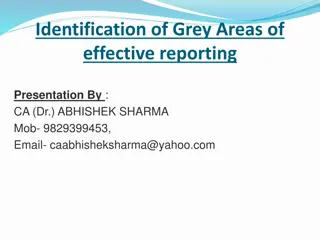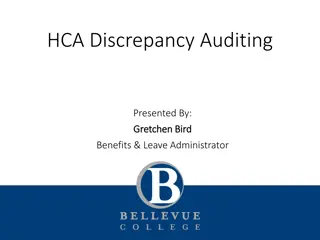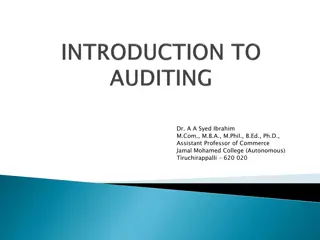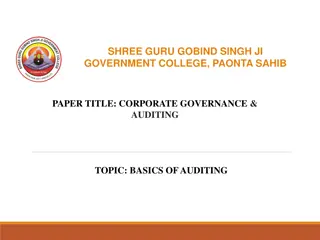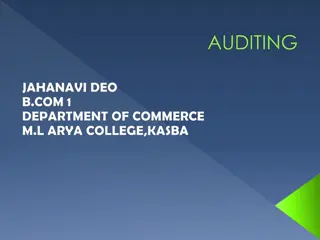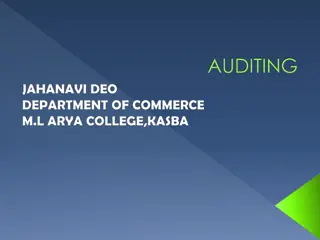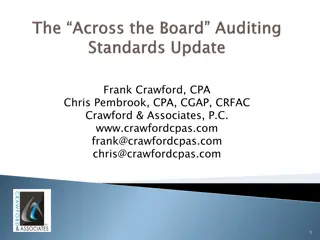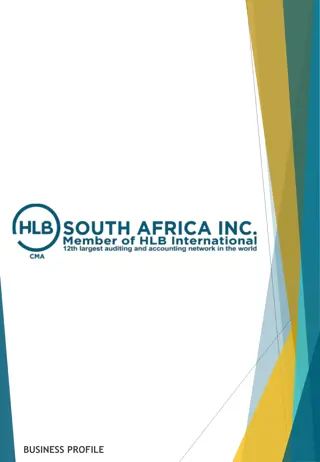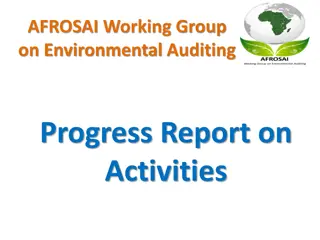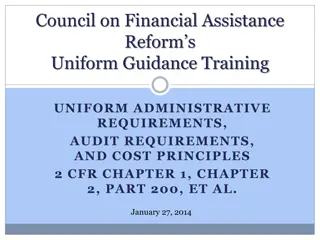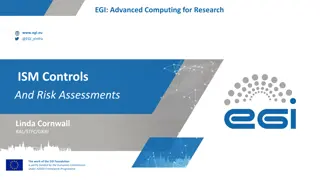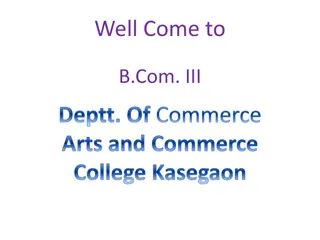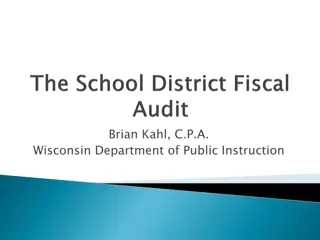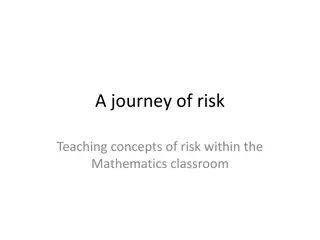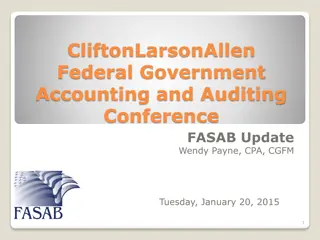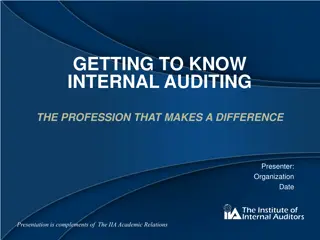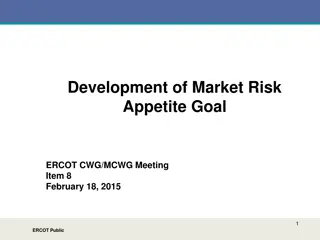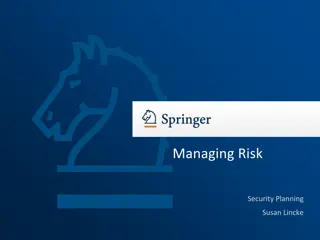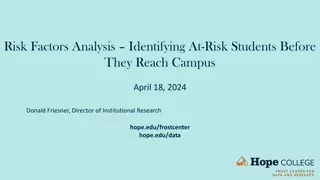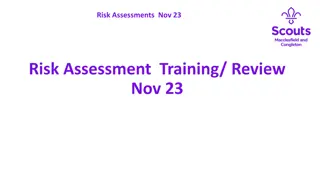ASQ Medical Device Auditor (CMDA) Exam | How to Prepare
Click Here---> https:\/\/bit.ly\/3OqYdTM <---Get complete detail on CMDA exam guide to crack Auditing. You can collect all information on CMDA tutorial, practice test, books, study material, exam questions, and syllabus. Firm your knowledge on Auditing and get ready to crack CMDA certification. Expl
8 views • 20 slides
Active Directory Auditing, cionsystems.com
A very simple and cost effective solution that makes active directory auditing easy proactively tracking and giving change alerts. https:\/\/rb.gy\/ttey9o
2 views • 7 slides
Financial Reporting and Auditing Procedures for Governor's Office of Elderly Affairs
This document outlines the financial reporting and auditing procedures followed by the Governor's Office of Elderly Affairs (GOEA). It includes details on monthly, quarterly, and annual financial reports, budget approvals, audit reviews, funding history, and specific requirements for various program
0 views • 18 slides
Understanding Risk Management in Environmental Geography and Disaster Management
Risk management in environmental geography and disaster management involves assessing the potential losses from hazards, evaluating vulnerability and exposure, and implementing strategies to mitigate risks. It includes calculating risk, dealing with risk through acceptance, avoidance, reduction, or
1 views • 10 slides
Introduction to Flood Risk Assessment with HEC-FDA Overview
This presentation delves into flood risk assessment using HEC-FDA software, covering topics such as defining flood risk, components of uncertainty, consequences of flood risk, and methods to assess flood risk including hydrology, hydraulics, geotechnical, and economics. It explores the intersection
6 views • 39 slides
Importance of Public Sector Auditing in Enhancing Accountability and Governance
The Auditor-General of South Africa plays a critical role in strengthening democracy through auditing public sector institutions. Public sector auditing ensures compliance, performance evaluation, and governance transparency, ultimately building public confidence. Key stakeholders include government
1 views • 11 slides
Understanding Auditing in Commerce: Key Concepts and Objectives
Auditing in commerce involves the systematic examination of financial, operational, and compliance information to ensure accuracy and conformity to standards. Learn about the definition, key objectives, types of audits, the audit process, auditor's responsibilities, and duties of an auditor.
7 views • 13 slides
Evolution of Auditing in Industry 4.0
The evolution of auditing from manual tools to semi-automated processes in Industry 4.0 is explored in this content. Audit 4.0 utilizes technologies like IoT, CPS, and smart factories to collect data for real-time assurance, marking a significant shift in audit methodologies towards efficiency and e
0 views • 31 slides
Understanding the Impact of Sections 143(9) and 143(10) of Companies Act, 2013
Exploring the significance of Sections 143(9) and 143(10) of the Companies Act, 2013, and their implications on active regulators, worried investors, and normal auditors. The session delves into defending past audits, highlights auditing standards in India, and provides insights into regulators' obs
0 views • 54 slides
Understanding Auditing: Meaning, Differences from Accounting, and Qualities of an Auditor
Auditing involves a systematic examination of financial records to ensure accuracy, while accounting focuses on recording and interpreting financial transactions. Learn about the origins of auditing, key differences from accounting, qualities required in an auditor, and the scope and objectives of a
1 views • 7 slides
Importance of Peer Review in Enhancing Assurance Services and Regulatory Compliance
Peer review plays a crucial role in strengthening public confidence in financial reporting, ensuring audit effectiveness, and maintaining quality across auditing firms. It helps bridge the gap between expected and actual service quality, restores public trust, and supports regulatory adherence. The
1 views • 31 slides
Comprehensive Energy Conservation and Auditing in Dairy Industry
Energy conservation, auditing, and efficiency play crucial roles in reducing production costs, improving environmental impact, and ensuring sustainability in dairy industrial plants. Through energy auditing, data is collected, energy losses are identified, and measures are implemented to save costs
0 views • 16 slides
Understanding Country Risk Analysis in International Business
Country risk analysis is crucial for multinational corporations (MNCs) to assess the potential impact of a country's environment on their financial outcomes. It includes evaluations of political and economic risks in foreign operations. Sovereign risk, political risk characteristics, and factors are
1 views • 61 slides
Key Aspects of Effective Reporting in Auditing & Corporate Governance
Effective reporting in auditing involves identifying grey areas, exercising due professional care, detecting material misstatements, and ensuring corporate governance. Auditors must be vigilant, apply their skills diligently, and provide reasonable assurance to stakeholders. Corporate governance pla
0 views • 27 slides
HCA Discrepancy Auditing Process Overview
Discover insights on HCA discrepancy auditing presented by Gretchen Bird, the Benefits & Leave Administrator. Gain valuable tips on running reports, handling discrepancies, and utilizing tools for effective auditing. Understand the significance of disclaimers, different types of discrepancies, runni
0 views • 10 slides
Evolution and Significance of Auditing in Commerce
Auditing, derived from the Latin term "audire," has a long history dating back to ancient civilizations. It plays a crucial role in verifying financial information and ensuring transparency in business operations. The process involves systematic examination of accounts to provide a true and fair vie
6 views • 17 slides
Basics of Auditing in Corporate Governance and its Origins
Auditing involves the examination of financial statements to ensure accuracy and reliability. The practice dates back to the early 20th century in India, with a focus on verifying accounting records for transparency. Various definitions and perspectives on auditing are discussed, emphasizing the imp
0 views • 28 slides
Importance of Vouching in Auditing: The Backbone of Detecting Errors and Frauds
Vouching plays a crucial role in auditing by checking evidential documents to detect errors, frauds, and ensure the accuracy and reliability of financial statements. It is essential for proving the fairness of results and detecting planned frauds. Through vouching, auditors can validate transactions
0 views • 7 slides
Project Risk Management Fundamentals: A Comprehensive Overview
Project risk management involves minimizing potential risks and maximizing opportunities through processes such as risk management planning, risk identification, qualitative and quantitative risk analysis, risk response planning, and risk monitoring and control. Quantitative risk analysis assesses t
0 views • 41 slides
Understanding Vouchers in Auditing: A Comprehensive Guide
Learn about primary and collateral vouchers, examples of different types of vouchers like cash receipts, cash payments, purchases, and sales, and their importance in auditing processes. Images and descriptions provided for better understanding.
0 views • 6 slides
Overview of Recent Auditing Standards and Guidance
The content discusses recent developments in auditing standards, including the release of SAS 145 by the AICPA and an Audit Guide on Risk Assessment. It also highlights various SAS numbers, topics, effective dates, and sections affected, providing insights into the evolving landscape of auditing pra
0 views • 76 slides
Comprehensive Business Profile of a Leading Auditing Firm Established in 1997
Established in 1997, this second-tier registered public accounting and auditing firm has achieved significant accolades, including being accredited as a JSE-registered auditor and reporting accountant. With a dedication to uplifting previously disadvantaged individuals, the firm holds a level 2 BBBE
0 views • 24 slides
Progress Report of AFROSAI Working Group on Environmental Auditing Activities
The AFROSAI Working Group on Environmental Auditing has made significant progress by adopting a work plan, setting objectives, and focusing on strategic pillars such as training, research projects, cooperative audits, and communication. The group aims to provide suitable products to SAIs, increase i
0 views • 25 slides
Reforming Audit Requirements for Federal Awards
This presentation outlines the major policy changes in the government-wide requirements for auditing Federal awards under the Single Audit Act Amendments of 1996. It discusses the transition from OMB Circular A-133 to Subpart F-Audit Requirements in 2 CFR Part 200, focusing on targeting audit requir
1 views • 34 slides
Understanding Risk Concepts and Management Strategies in Finance
Explore the essential concepts of risk in finance, such as risk definition, risk profiles, financial exposure, and types of financial risks. Learn about risk vs. reward trade-offs, identifying risk profiles, and tools to control financial risk. Understand the balance between risk and return, and the
0 views • 18 slides
Risk and Return Assessment in Financial Management
This comprehensive presentation explores the intricacies of risk and return assessment in the realm of financial management. Delve into understanding risk concepts, measuring risk and return, major risk categories, and the impact of risk aversion on investment decisions. Gain insights into the manag
0 views • 62 slides
Risk Management and Security Controls in Research Computing
The European Grid Infrastructure (EGI) Foundation conducts risk assessments and implements security controls in collaboration with the EOSC-hub project. The risk assessments involve evaluating threats, determining likelihood and impact, and recommending treatment for high-risk threats. Results from
0 views • 13 slides
Risk Management & MPTF Portfolio Analysis at Programme Level for UN Somalia
This session delves into the world of risk management and portfolio analysis at the programme/project level, specifically focusing on the Risk Management Unit of the United Nations Somalia. It covers enterprise risk management standards, planned risk management actions, the role of RMU, joint risk m
0 views • 30 slides
Understanding Auditing: Types, Objects, and Differences Explained
Auditing in the field of commerce involves verifying accounts and statements to ensure accuracy and compliance, with a focus on detecting errors and frauds. This content covers the main and subsidiary objects of auditing, types of audits such as statutory and internal audits, and the differences bet
0 views • 19 slides
Alcohol and Cancer Risk: Understanding the Links
Alcohol consumption is linked to an increased risk of various cancers, including mouth, throat, esophagus, breast, liver, and colorectal cancers. Factors such as ethanol, acetaldehyde, nutrient absorption, estrogen levels, and liver cirrhosis play a role in this risk. Even light drinking can elevate
0 views • 17 slides
Auditing Standards and Requirements in Wisconsin Department of Public Instruction
Understanding the auditing standards and requirements for financial statements audits in the Wisconsin Department of Public Instruction, including the role of management, statements on auditing standards, independence criteria, technical training needed for auditors, and services performed by indepe
3 views • 70 slides
Understanding Risk Concepts in the Mathematics Classroom
Risk is a concept integral to decision-making in various aspects of life. This resource explores how risk is defined in the real world, its relevance in the classroom, and strategies for teaching risk literacy to students. It delves into the multiple definitions of risk, risk analysis, and the emoti
0 views • 62 slides
Federal Government Accounting and Auditing Conference Update
CliftonLarsonAllen presents the Federal Government Accounting and Auditing Conference update, discussing topics such as fiscal sustainability, fiscal projections, social insurance, and standards-setting over the past 25 years. The event highlights important projects related to risk, assumed leases,
0 views • 31 slides
Understanding Internal Auditing: A Profession of Value
Internal auditing is an independent, objective activity that enhances organizational operations by evaluating risk management, control, and governance processes. Internal auditors assess risks, evaluate controls, suggest improvements, ensure compliance, and detect fraud. They play a crucial role in
0 views • 16 slides
Understanding Organizational Risk Appetite and Tolerance
Explore the development of market risk appetite goals and how to define and establish organizational risk tolerance. Learn about the Classic Simplified View of Risk Tolerance and different methods to determine risk appetite. Discover the importance of assessing market risk impact and aligning risk t
0 views • 8 slides
Developing a Risk Appetite Culture: Importance and Framework
Risk management plays a critical role in the success of corporations, with strategy and risk being intertwined. This presentation delves into definitions of key terms such as risk appetite, the Risk Appetite Cycle, characteristics of a well-defined risk appetite, and the importance of expressing ris
0 views • 31 slides
Security Planning and Risk Management Overview
This content provides an in-depth exploration of managing risk, security planning, and risk appetite in the context of cybersecurity. It covers essential concepts such as risk management process, threat types, risk analysis strategies, vulnerability assessment, and risk mitigation techniques. The ma
0 views • 73 slides
Risk Factors Analysis: Identifying At-Risk Students Before They Reach Campus
Risk Factors Analysis aims to identify students at risk of attrition before they even arrive on campus by evaluating academic, financial, minority, and first-generation factors. The method involves choosing specific risk factors, tracking historical prevalence, calculating relative risk, and predict
0 views • 15 slides
Comprehensive Risk Assessment Training Overview
In this risk assessment training session held on November 23, participants reviewed the process of writing and reviewing risk assessments to enhance the quality of assessments for safer scouting experiences. The training aimed to improve leaders' skills and confidence in risk assessment practices wh
0 views • 37 slides
Importance of Logging and Auditing in Cybersecurity
Discussing the significance of logging and auditing in cybersecurity, emphasizing the need for both a priori and a posteriori techniques to prevent security violations. Logging helps record events for system analysis, while auditing involves analyzing log records to provide understandable system inf
0 views • 32 slides

